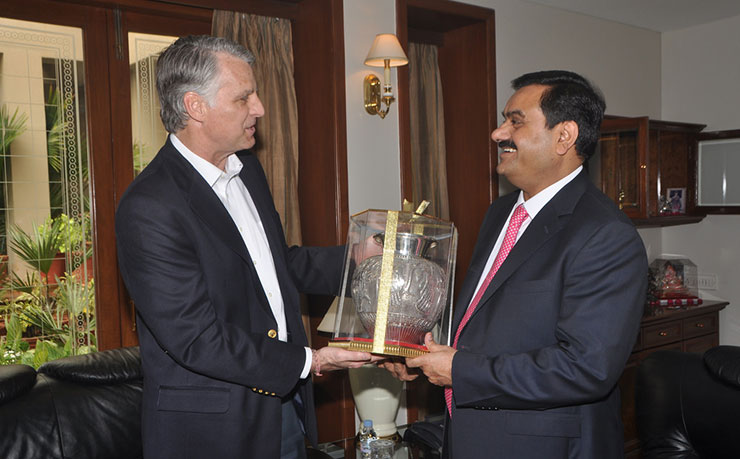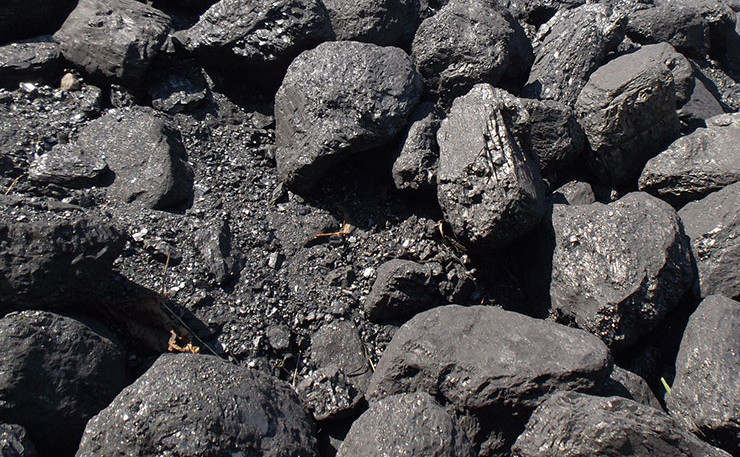Vale an Australian political system that can approve a mining project so clearly against the national interest. Ben Eltham explains.
Let us assume for a moment that the Carmichael coal mine in Queensland does go ahead. Leaving aside the huge hurdle of finance, the mine has cleared all necessary approvals.
What does that say about the health of Australia’s democracy?
The answers to that question are worrying. Australia’s system of regulatory and environmental approvals has failed in the case of the Carmichael mine, letting a development through that no sane policy could justify.
Carmichael illustrates what is broken in Australian politics, like few other issues. The planned mine is so large, it will materially affect the future of global warming. It will help destroy the Great Barrier Reef. As climate campaigner Bill McKibben wrote in 2016, “you can’t have both the Paris climate agreement and Adani’s Carmichael coalmine. Full stop.”
A dubious foreign corporation with a record of environmental damage and corruption, Adani possesses the very opposite of a social license to operate. The Carmichael mine is opposed by the majority of voters. It is manifestly against the best interests of the nation and the planet. It will harm the environment of all current and future citizens, by contributing to the dangerous warming of the oceans and atmosphere.
Against these vast costs, the benefits accrue to a tiny few. Carmichael will create just a handful of jobs, benefit only a select few workers. But it will further enrich its owner, a shadowy Gujurati oligarch whose business skills appear to be outweighed by his impeccable political connections.

The fact that the Carmichael mine has secured all necessary environmental and regulatory approvals tells us that something is very wrong with Australian public policy. The approval of this planet-cooking disaster could only occur in a political system where the voices of profit speak with more power than the voices of ordinary voters.
The latter are cynical about politicians, but if anything, the Carmichael decision shows they should be even more sceptical of the motivations of elected officials than they already are.
The current situation suggests Adani’s lobbying effort has been phenomenally successful. The company is on the brink of developing a vast project in the teeth of widespread criticism and public opposition.
Just to spell it one more time, building an enormous coal mine in 2017 is a really bad idea. A mine that will spew out 4.7 billion tonnes of carbon during its lifetime is radically incompatible with a safe climate.
Carbon emissions are the direct and proximate cause of the rapid death of the Great Barrier Reef, by coral bleaching. The insane juxtaposition of corporate profit at the expense of a natural wonder of the world tells you everything you need to know about the failure of Australia’s political classes.
Even on the grounds of fiscal and corporate probity, Carmichael is an investment of almost singular opacity.
The ABC’s excellent investigation into Adani last week demonstrated that the majority of the revenue from Carmichael will be routed through known tax havens and secrecy jurisdictions, including shell companies in Singapore and accounts in the British Virgin Islands. On these grounds alone, questions must be asked about Adani’s tax minimisation that the Australian government has willingly signed up to.
Nothing seems to stop the Carmichael juggernaut. Adani has proved itself to be a stunningly effective negotiator. The fillips and special incentives include a swathe of public investments and tax breaks, including a mining royalty agreement with the Queensland government, and public investment by a number of Queensland regional councils. The Townsville and Rockhampton municipalities have even partnered on a $15.5 million spend to build the Carmichael airport.
Queensland has extended plenty of other favours to Adani. The Newman LNP government was all set to give Adani half a billion dollars for the rail link to the coal fields, before losing the 2015 election. The Palaszczuk government amended the state’s Water Act to prevent further scrutiny of Adani’s massive grants of water licenses.
Despite prevailing suspicion, it is not generally understood how influential lobbying can be. Important factions of the Queensland Labor Party have long been intimately involved in resource politics, and successive Queensland ALP governments have shown themselves to be firm friends of the mining and energy sectors. Sections of Federal Labor are also in support of the mine.
The initial mining exploration approvals for the Galilee Basin were first opened up under Anna Bligh, who was a keen supporter of mining and resource jobs in regional Queensland. A decade on, Bligh’s successor Annastacia Palaszczuk has been just as enthusiastic, wooing Adani owner Gautam Adani at high-profile media stunts, culminating in that now-notorious handshake in the offices of the Port of Townsville.

Queensland’s ever-fraught political atmosphere has played into the hands of a clever multinational conglomerate that has shown itself to be adept at navigating highly-politicised development approvals in India. A razor-thin Parliamentary majority and a looming election have combined with the perilous factional balance within the Queensland ALP in Adani’s favour.
Palaszczuk, a surprise victor in 2012’s unwinnable election, is a scion of the Queensland right; her father was a Beattie government minister. But the balance of power within the broader party machinery tilts left. With the left holding the numbers but lacking the will to roll Palaszczuk, Labor’s pro-Carmichael right wing remains in charge.
The lobbying connections between mining and the Queensland ALP go deep. Many Labor staffers and numbers men have found work in the resource sector, when not on ALP duty – particularly after the election of Campbell Newman in 2012. The most prominent Labor operative with links to Adani is Cameron Milner, one of the key factional bosses in the Queensland right, and a former chief of staff for none other than Bill Shorten.
Milner is one of the most experienced and best-networked players in the Queensland ALP. As state secretary of the Queensland party, he masterminded election campaigns for Peter Beattie, Anna Bligh and Kevin Rudd. Milner bagged Adani as a client of his lobbying vehicle – the wonderfully named Next Level Strategic Services – in 2015.
Now Milner is back, working for both Adani and Palaszczuk at the same time.
Responding to questions recently about Milner’s role, Premier Palaszczuk was dismissive.“Cameron Milner is a great campaigner, he has worked as party secretary and his role is to advise on the campaign, clear and simple,” she told journalists.
Cynical political brush-offs like this are unfortunate. They underline the deep contempt that many politicians appear to harbour for voters. It should be immediately apparent that it is unacceptable for a paid lobbyist for a fossil fuel company to work on a premier’s re-election campaign, even in a voluntary capacity.
Queensland’s lobbying rules are actually stricter than their federal counterparts, but, as usual, they are too weak to outlaw this kind of obvious conflict of interest. Nor is the state corruption body likely to enquire of the probity of a senior resource sector lobbyist moonlighting in the office of a Premier campaigning for re-election.
Matters are hardly better at federal level, where the Coalition’s commitment to the mine is tinged by ideological fervour. Fossil fuels have assumed a talismanic political symbol for the Liberal and National Parties, vividly on display when a lump of coal was brought into the House of Representatives. Environment minsters Greg Hunt and Josh Frydenberg have vocally campaigned for the mine. Resources minister Matt Canavan, before and since he was forced to stand down over his citizenship status, remains been a strident proponent of Carmichael, even while threatening environmental groups opposed to the mine with revoking their charity status.
Stunning day in NQ for major announcement on Adani jobs. Flying over Dalrymple Bay and the reef pic.twitter.com/mG757RKXK5
— Matthew Canavan (@mattjcan) December 6, 2016
The Carmichael mine was approved under the Queensland Environmental Protection Act and the federal Environmental Protection and Biodiversity Conservation Act. Dramatic flaws have been revealed in both.
Quite obviously, this mine will damage the environment and biodiversity. Queensland environmental law academic Chris McGrath argues that the mine’s approval represents a number of fundamental failures in existing environment law. And yet both the Queensland Supreme Court and the Federal Court of Australia have upheld Adani’s approvals, as legal under the letter of environment law.
And yet for more than a decade the scientific community, including the CSIRO and the Great Barrier Marine Park Authority, have explicitly told governments that carbon emissions cause reef bleaching. Famous reef researcher Charlie Veron has put it best, when he simply notes that approving Carmichael in the midst of coral bleaching “defies reason.”
“Coal mining is the number one danger to coral reefs now in the whole world,” Veron said this year.
The largest coal mine in Australia cannot possibly be in the interests of the Australian environment. A development like this is a vivid illustration of the impotency of Australian state and federal environment laws. These laws, and the regulatory systems they support, have failed us.
If environment law can’t stop the mine, we shouldn’t expect the comparatively weak provisions of native title law to hold much purchase. And indeed, a number of tribunals and courts have ruled against Indigenous owners of the Wangan and Jagalingou nations in their attempts to assert native title to prevent the mine.
But it is the politicians, who wrote the laws, who have failed us most abjectly.
The highest duty of an elected premier and prime minister is, ultimately, to safeguard the best interests of the voters of their state and nation. That hasn’t happened with Carmichael. This mine is against the best interests of all voters, including future voters, and even against the best interests of those lucky few that may benefit in the short-term in the form of a mining job.
The Carmichael mine is a potential global environmental catastrophe. Only in a broken system could it be allowed to go ahead.
Donate To New Matilda
New Matilda is a small, independent media outlet. We survive through reader contributions, and never losing a lawsuit. If you got something from this article, giving something back helps us to continue speaking truth to power. Every little bit counts.






